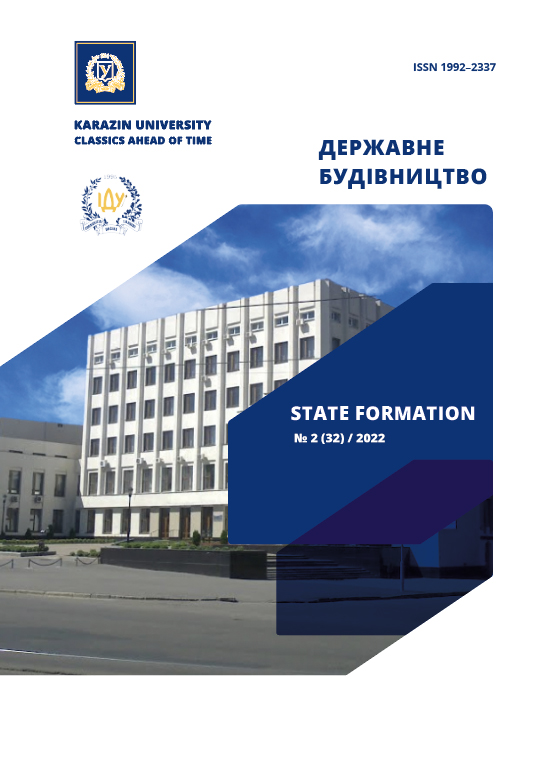Theoretical and methodological aspects of the essence of the concept of “Public governance”
Abstract
The article highlights the main approaches to defining the main theoretical and methodological aspects of the essence of the concept of “public administration”; identified scientific approaches to the definitions of public administration; outlines a scientific discussion around the theoretical foundations of the process of public administration. The change of scientific approaches to understanding the essence of the concept of “public administration” and the parallel application of the concept of “public administration” in the context of the development of democracy and civil society in Ukraine. Emphasis is placed on the need to increase the efficiency of public administration at all levels and to revise the model of public administration, which should aim to meet the demands of the population throughout the country. It is emphasized that management is a complex social process that involves purposeful influence on human activity, society in order to obtain a specific expected result.
It is stated that public administration is a kind of socially useful activity carried out by a certain set of entities, including public authorities, which are interconnected with public administration, because public administration is carried out as part of society itself. Public administration arises as a result of a certain social agreement between the state and society. The subject and at the same time the object of public administration is civil society, public associations, organizations, public authorities. Emphasis is placed on the fact that the state policy of decentralization involves the transformation at the territorial level of local government into a real entity with powers and resources that will address all organizational, social, financial and other issues in a given area. Public administration is a complex process of state and municipal administration, the purpose of which is to control the activities of public authorities and local self-government by citizens through the system of suffrage. Public administration is a type of socially useful activity carried out by a certain set of entities, in particular public authorities, which are interconnected with public administration, because public administration is carried out as part of society itself. Public administration arises as a result of a certain social agreement between the state and society.
The subject and at the same time the object of public administration is civil society, public associations, organizations, public authorities. Public administration is a system consisting of organizational, political, legal, economic mechanisms of public administration and the mechanism of local self-government. The main idea of public administration is the management of society together with society itself, where partners of public authorities in addressing a wide range of socially important and important issues are public associations, religious organizations, various civil society institutions, commercial institutions, etc., legal entities and individuals. exercising public control over public administration decisions, etc.
Downloads
References
2. Arabadzhyisky, N. (2014). Directions in the theory of public administration. Public Administration aspects, tom. 2, no. 1–2, 5–11. DOI: https://doi.org/10.15421/15141
3. Bakumenko, V.D., Bashkatov, V.M. (2015). Mekhanizmy derzhavnoho upravlinnia demokratychnymy zminamy. Kyiv: AMU [in Ukrainian].
4. Hlosarii Prohramy rozvytku OON. URL: http://www.unpan.org/Directories/ UNPublicAdministrationGlossary
5. Public Administration. (2011). Encyclopedia Of Public Administration: u 8 t. T. 1. Theory of Public Administration; V.M. Kniaziev, I.V. Rozputenko and others (Eds.). Kyiv: NADU, 157–159
[in Ukrainian].
6. Derzhavne upravlinnia: teoriia i praktyka (1998); V.B. Averianova (Ed.). Kyiv: Yurinvom Inter [in Ukrainian].
7. Kiliievych, O. (2003). Anhlo-ukrainskyi hlosarii terminiv i poniat z analizu derzhavnoi polityky ta ekonomiky. Kyiv: Vyd-vo Solomii Pavlychko «Osnovy» [in Ukrainian].
8. Kobylianskyi, Y. (1912). Latynsko-ukrainskyi slovar dlia serednikh shkil. Viden
[in Ukrainian].
9. Kolesnykova, K. (2013). The relationship between public administration and public administration in the process of systemic transformation. Publichne upravlinnia: teoriia ta praktyka, vol. 3 (15), 41–45 [in Ukrainian].
10. Lazor, O.Ya., Lazor, O.D. (2015). Public Management and Administration: Some Retrospective Theoretical Aspects. Universytetski naukovi zapysky, vyp. 56, 111–121
[in Ukrainian].
11. Mykhailovska, O.V., Filipova, N.V., Ladonko, L.S., Tkalenko, N.V. (2016). Analiz teoretychnykh pidkhodiv do vyznachennia sutnosti skladovykh definitsii publichnoho upravlinnia ta administruvannia. Universytetski naukovi zapysky, no. 2 (58), 241–253 [in Ukrainian].
12. Obolenskyi, O.Yu. (2009). Provisnyky novoho publichnoho upravlinnia. Rozvytok publichnoho administruvannia na zasadakh menedzhmentu: yevropeiskyi kontekst : materialy nauk.-prakt. konf., Dnipropetrovsk, 15–16 travnia 2009 r. 3–8. Dnipropetrovsk: DRIDU NADU
[in Ukrainian].
13. Pasalskyi, M. (2015). The concept of public administration in modern legal science. Legal Ukraine, no. 7–8, 17–21 [in Ukrainian].
14. Petrova, I., Ruda, O. (2017). Public administration as a factor and stimulator of modernization of administrative law. Administrative law and process, no. 6, 131–135
[in Ukrainian].
15. Publichne vriaduvannia i publichne administruvannia. (2011). Entsyklopediia derzhavnoho upravlinnia: u 8 t. T. 8: Publichne vriaduvannia; V.S. Zahorskyi, S.O. Teleshun (Eds.). Lviv: LRIDU NADU, 488–491 [in Ukrainian].
16. Pukhkal, O.G., Tyutyunnyk, I.V. (2015). Theoretical and methodological approaches to determining the essence of the concept of public administration. Investments: practice and experience, no. 18, 93–97 [in Ukrainian].
17. Rubtsov, V.P., Perynska, N.I. (2008). Derzhavne upravlinnia ta derzhavni ustanovy. Kyiv: Universytet «Ukraina» [in Ukrainian].
18. Saburova, H.B. (2021). Main directions of developing the public management system in Ukraine. Public management and administration in Ukraine, vyp. 21, 23–27. DOI: https://doi.org/10.32843/ pma2663-5240-2021.21.5 [in Ukrainian].
19. Sotsialne upravlinnia: dovidnyk (1986); V.L. Vasylenko and others (Eds.). Kyiv: Politvydav [in Ukrainian].
20. Tsvietkov, V. (1996). Derzhavne upravlinnia: osnovni faktory efektyvnosti (polityko-pravovyi aspekt). Kharkiv: Pravo [in Ukrainian].
21. Chernov, S.I., Haiduchenko, S.O. (2014). Tekst lektsii z dystsypliny «Publichne administruvannia». Kharkiv: KhNUMH [in Ukrainian].
22. Sharov, Yu.P. (2010). Innovatsiini instrumenty publichnoho administruvannia: yevropeiskyi kontekst. Publichne upravlinnia: teoriia ta praktyka, no. 1, 5–9. Kharkiv: DokNaukDerzhUpr [in Ukrainian].
23. Sharov, Yu., Chykarenko, I. (2010). Yevropeiski standarty publichnoho upravlinnia: proektsiia na munitsypalnyi riven. Public administration and local governmen, vyp. 1(4), 295–304. DRIDU; NADU [in Ukrainian].
24. Public administration. URL: http://www.unpan.org/DPADM/ProductsServices/ Glossary/tabid/1395/language/enUS/Default.aspx [in Ukrainian].

